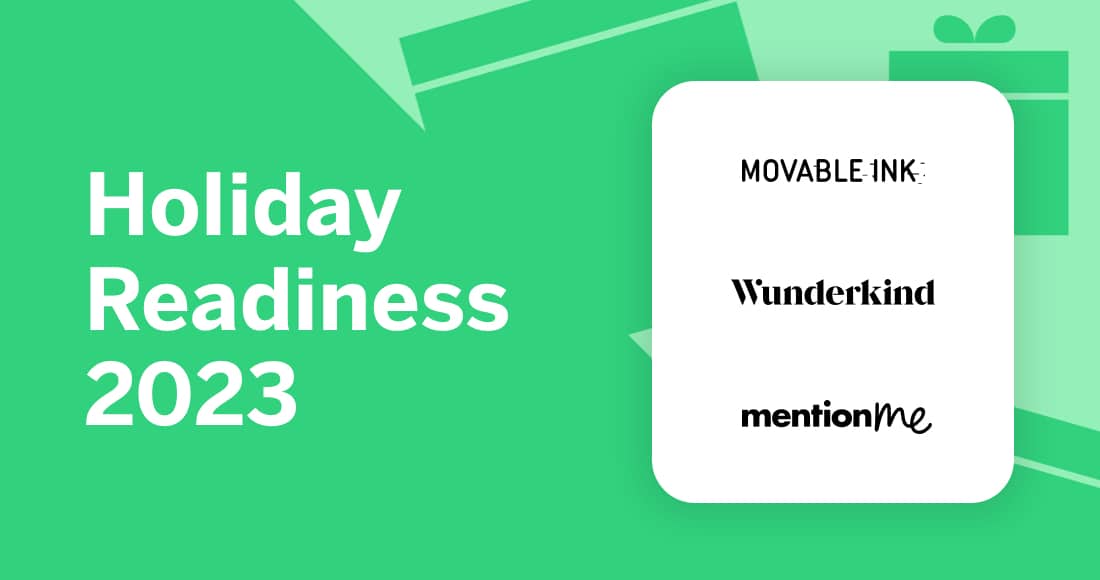With the busy holiday shopping season on the horizon, marketers are hard at work shaping up their customer engagement strategy to ensure the best results.
More shoppers, more purchases, at higher values — those are the goals. But competition is fierce as brands clamor for the attention of their customers, and those customers are more discerning than ever. This leaves little room for error when it comes to crafting a holiday plan built on highly satisfying experiences while also delivering growth and revenue for the business.
As you start putting the final touches on your 2023 holiday customer engagement strategy, consider these 6 expert tips from our friends and technology partners: Movable Ink, Mention Me, and Wunderkind.
1. When it comes to promotions, focus on quality over quantity
Going into this holiday season, many marketing teams will have to deal with tighter budgets and smaller headcount. This makes the notion of “doing more with less” not just economical, but essential.
But a smaller budget doesn’t necessarily mean smaller impact. Rather than spending money on a wide array of holiday promotions, the most successful brands will be the ones that can maximize the quality and efficacy of a few key promotions.
Here’s what our friends at Movable Ink — experts in personalized brand experiences — had to say:
“Based on several themes we’re seeing play out ahead of this year’s peak season, we’re encouraging brands to maximize promotion effectiveness and keep customers engaged during longer buying cycles. It’s not about doing more promotions; it’s about increasing the effectiveness of what brands are already doing.”

Of course, another way to improve the quality of your promotions is to incorporate personalization when and where possible. This makes your messages more resonant and relevant to the customer, increasing the likelihood of a conversion.
“Personalizing promotions can go a long way. More than 50% of consumers require relevant discounts when making purchases, so personalizing your tentpole discounts with relevant products and hero messaging is an effective strategy all year around.”

2. Lean on referrals to attract valuable customers
Discounting is a surefire way to attract and engage new shoppers. But it comes at a cost. Literally.
Although discount-based incentives are highly appealing to customers, they eat away at your margins. Plus, many of those customers won’t even return to your brand, unless you offer more discounts and then… suddenly you’re in a dizzying spiral of endless discounting.
This year, lean into referrals as a way to attract new customers that are more likely to stick around and generate a higher lifetime value. This is a powerful strategy recommended by our partners at Mention Me — masters of referral marketing:
“Many brands struggle after the holiday season because they use discounts to attract a huge number of new customers, but these shoppers don’t return to make another purchase. This can lead brands to do even more costly discounting to win them back, or spending precious budget to ‘re-acquire’ them on paid channels. Instead, brands should encourage and track word-of-mouth recommendations to identify valuable advocates in their customer base.”

Customers that arrive at your brand via a referral are more likely to stick around, spend more over time, and even bring you new customers. And the proof is in the numbers. According to Mention Me:
“We know that referred customers have a 2x higher lifetime value and are 5x more likely to refer onwards, which helps drive sustainable organic growth without spending extra budget. And once you’ve identified your advocates, you can use the insights gained to tailor your segmentation and contact strategy — keeping them engaged and maximizing their revenue.”

3. Use personalized marketing to cut through the noise
The holiday shopping season is a critical time of year for your marketing. The same is true for your competitors. Just like you, they’re doing everything they can to get the attention of shoppers. As a result, your customers get bombarded with promotions and communications from various brands, and only the most relevant and impactful messages will stick.
So how do you make your message stick? Use personalized marketing.
Personalization is one of the most important aspects of a successful holiday customer engagement strategy. And our partners at Wunderkind — specialists in helping brands deliver personalized experiences through owned channels — agree:
“Customers will be flooded with email and SMS marketing as the holiday season approaches, so personalized messaging will be vital in order to cut through the noise. We suggest that brands leverage owned channels to properly keep track of potential customers’ activity and behaviors. The information gathered from those channels will enable the brand to send personalized emails and text messages that actually resonate with the customer — whether it be cart abandonment campaigns, price drop alerts, or special holiday offers.”

4. Prioritize mobile to boost your omnichannel strategy
Mobile channels are some of the best touchpoints for connecting with your customers. Whether it’s push notifications, SMS, in-app, or mobile wallet passes — mobile channel engagement lets you reach your customer wherever they are at the most impactful moments. This is especially true during the holidays, when customers are even more active on their mobile devices.
Our partners at Movable Ink confirm the importance of mobile for retail and e-commerce brands this holiday season, and how it serves as the cornerstone of a complete omnichannel customer engagement strategy.
“Mobile is the key to bridging channels. The reality is that most e-commerce sales are going through the mobile channel, and while customers shop in-store, they are often on their phones. In fact, mobile made up the majority of last year’s cyber five e-commerce sales for the first time — and that share is only predicted to grow for the 2023 holiday season.”

Movable Ink also stresses the importance of leveraging push and in-app notifications in particular:
“Retailers will want to push app activity. Movable Ink can help support this with device-targeted banners that drive customers to download the brand’s app. We can also target customers with messaging to enable notifications if that opt-in data can be passed to us. Using push notifications, we can help retailers put their most successful campaigns like personalized product recommendations or replenishment reminders directly on their customers’ home screens.”

5. Know your customer’s value beyond their individual spend
Amidst economic uncertainty, many customers will be tightening their budgets this shopping season. As a result, customers will be spending less. But that doesn’t necessarily mean they will be less valuable to your brand.
Instead of looking solely at how much an individual customer spends, look at their degree of loyalty and brand advocacy too. Your biggest advocates might not be your biggest spenders, but if they’re bringing a wide swath of their friends and family — new customers — to your brand, they might be having a larger positive impact on your revenue than you realize.
When it comes to knowing your customer’s value, here’s what Mention Me recommends:
“Consumers are understandably spending less at the moment, and it’s likely this will continue throughout the holiday season. That’s why it’s more important than ever for brands to not view a customer’s individual spend as the ultimate indicator of their value. If you’re only looking at LTV and RFM models to determine who your VIPs are, you’re missing out on a huge segment of customers who are indirectly generating revenue for your business by bringing along their friends and family.”

6. Skip the batch-and-blast emails and get granular
So many holiday shoppers to reach, so little time…
In an effort to reach as many customers as possible, it makes sense that part of your holiday marketing strategy would include generic batch-and-blast content. And perhaps there are a few promotional messages that really will appeal to everyone, and thus, can be delivered as a one-size-fits-all communication. But the reality is, these kinds of generic messages end up feeling dull and irrelevant to today’s customers, many of whom have grown accustomed to receiving 1:1 engagements from the brands they love.
When and where possible, get granular — dig into your customer’s preferences and behavioral data to determine what they really want, and personalize your content accordingly. Our friends at Wunderkind say it best:
“Rather than focusing on generic discounting/promotional messaging (which consumers will be bombarded with during the holidays), focus on understanding the shopping preferences and behaviors of new and existing customers in order to tailor your messaging to resonate with them on an individual level. Instead of casting a wide net and blasting promotional emails to all your customers, taking the time to become more granular and personalized with the messaging will result in higher conversions and help your brand stand apart from competitors.”

Are you ready for the holiday season?
Day by day we inch closer to the holidays. Now is the time to evaluate whether you and your marketing team have the holiday customer engagement strategy in place to deliver the results your business demands.
If you’re facing any uncertainty in your plan, the tips included in this article, provided by our technology partners at Movable Ink, Mention Me, and Wunderkind, can help you. Apply these insights to strengthen your holiday game plan and maximize growth and revenue.
And if you want to learn how some of the world’s best brands are tackling their holiday plans, be sure to check out our holiday readiness hub: Power Up Your Holiday Customer Engagement Strategy.











